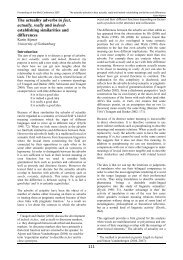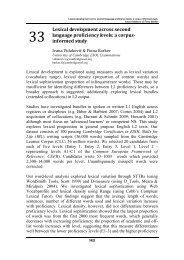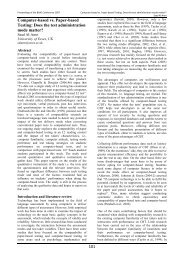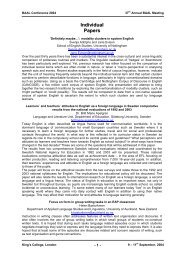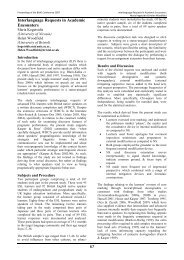Proceedings of the - British Association for Applied Linguistics
Proceedings of the - British Association for Applied Linguistics
Proceedings of the - British Association for Applied Linguistics
Create successful ePaper yourself
Turn your PDF publications into a flip-book with our unique Google optimized e-Paper software.
15<br />
Phonics or fun?<br />
Helen Horton<br />
University <strong>of</strong> Sunderland<br />
79<br />
Phonics or fun?<br />
Helen Horton<br />
Is our preoccupation with decoding and analysis in <strong>the</strong> teaching <strong>of</strong> reading<br />
killing our children’s sheer enjoyment <strong>of</strong> engaging with books?<br />
The announcement <strong>of</strong> Michael Grove in November 2010 that <strong>the</strong>re will be<br />
‘a light –touch phonics-based test <strong>for</strong> all year 1 pupils in England’ is<br />
predicated on <strong>the</strong> premise that failure to achieve in reading is directly<br />
correlated to phonemic awareness. This initiative follows as a direct result<br />
<strong>of</strong> <strong>the</strong> recommendations <strong>of</strong> <strong>the</strong> Rose Report (2008) that <strong>the</strong> Searchlights<br />
approach to <strong>the</strong> teaching <strong>of</strong> reading should be replaced by programmes<br />
designed to teach purely syn<strong>the</strong>tic phonics.<br />
In direct contradiction, however, are <strong>the</strong> findings <strong>of</strong> <strong>the</strong> recently published<br />
Tickell Review <strong>of</strong> <strong>the</strong> Early Years Foundation Stage (EYFS)<br />
recommending that such testing <strong>of</strong> 5 year olds should be scrapped. The<br />
findings <strong>of</strong> <strong>the</strong> review acknowledge that, whilst recent early years strategies<br />
<strong>for</strong> <strong>the</strong> teaching <strong>of</strong> phonics had been successful this has not led to an<br />
increase in standards <strong>of</strong> reading.<br />
‘There is ... evidence to show that if children are to develop reading skills,<br />
<strong>the</strong>y continue to need a balanced range <strong>of</strong> experiences which support <strong>the</strong>ir<br />
social and emotional needs’.<br />
Whitehead 2009 as cited in <strong>the</strong> Tickell Review<br />
In order to be fluent readers children do need to learn basic decoding skills,<br />
however, due to <strong>the</strong> phonemic variation within <strong>the</strong> English language,<br />
children develop <strong>the</strong>ir reading skills through a multi faceted approach. By<br />
<strong>the</strong> rigid application <strong>of</strong> a rule based system, <strong>the</strong>re is a danger that children<br />
will become frustrated by <strong>the</strong>ir own ef<strong>for</strong>ts, thus put <strong>of</strong>f she sheer<br />
enjoyment that books can bring and become part <strong>of</strong> a world where written<br />
words seem to be enemies ra<strong>the</strong>r than friends.<br />
Fur<strong>the</strong>rmore <strong>the</strong> Tickell review recommends that play is <strong>the</strong> best vehicle<br />
<strong>for</strong> developing learning. Through such, in line with Vygotsky’s Social<br />
Learning Theory (1934) children gain social and communication skills. By<br />
engaging with books as a naturally occurring part <strong>of</strong> <strong>the</strong> learning



